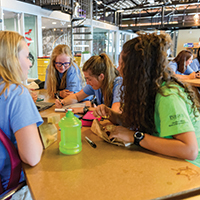 Ongoing advances in artificial intelligence and automation must be carefully evaluated from both an economic and social perspective, says Mohammad Rahman, a professor at Purdue’s Krannert School of Management who researches big data and omnichannel retailing. (Stock image)
Ongoing advances in artificial intelligence and automation must be carefully evaluated from both an economic and social perspective, says Mohammad Rahman, a professor at Purdue’s Krannert School of Management who researches big data and omnichannel retailing. (Stock image)
Big Data, Big Business, Big Questions
Giant Leaps in AI, Algorithms and Automation
In a future with autonomous vehicles, cars could suggest where to stop for coffee in the morning and pick up groceries after work, altering not only the way humans travel but also how they shop and how they’re targeted by retailers.
Today, online marketplaces like Airbnb, a hospitality service for people to rent or lease anything from holiday cottages and homestays to hotels and hostels, are already changing where people travel and spend their money with features to facilitate dining and tourism in their chosen destination.
Mohammad Rahman, a professor at Purdue’s Krannert School of Management who researches big data and omnichannel retailing, says these and other “disruptive” technologies need to be evaluated from both an economic and social perspective.
“There are complications around making this marketplace work. It’s not only the choices made by the consumer but also how the retailers react,” Rahman says. “Technologies that act as personal assistants are becoming the gatekeepers to consumers. If you don’t strategically use them, you’re going to be forgotten.”
Driving Change
 The rise of self-driving vehicles presents a unique opportunity for partnerships with the automobile industry to reach consumers more effectively, Rahman says: “We’re starting to see evidence of these cars becoming a platform for commerce. That brings a completely different layer to retailing.”
The rise of self-driving vehicles presents a unique opportunity for partnerships with the automobile industry to reach consumers more effectively, Rahman says: “We’re starting to see evidence of these cars becoming a platform for commerce. That brings a completely different layer to retailing.”
In late 2017, General Motors rolled out Marketplace, the auto industry’s first platform for the on-demand purchasing of goods and services ranging from a cup of coffee to a tank of gas using a dashboard touchscreen. GM also recently unveiled its driverless car concept, the “Cruise AV,” with plans to roll out a fleet by 2019. Toyota announced a deal with Amazon and Pizza Hut to provide self-driving delivery cars by 2020.
Now, Purdue’s on board with the recently announced Innovation Hub for Connected and Autonomous Transportation Technologies in Discovery Park, which will bring together the University, public agencies and private partners in a joint research effort focusing on the expanding research field of connected and autonomous vehicles.
Although retailers such as grocery stores are already changing their business models with services such as curbside pickup and home delivery, the convenience and popularity of digital personal assistants — including autonomous vehicles — means companies will have to find new ways to break through to customers, Rahman says.
“Being a good retailer is no longer enough,” he says. “If you’re not getting through that glass ceiling to the consumer, then you are basically stuck.”
Self-driving cars also will require a massive amount of data from both consumers and corporations to operate in such a way, a compromise some may not be willing to make.
“What’s needed is data about practically everything about your life,” he says. “Your car needs to know a lot about you because it learns from data; it can only act based on the data. It needs to know the plan for the day, how many meetings you have and where you are going. Right now, this is all possible, so long as you don’t feel creepy about giving access to all this data.”
Economic Spillover
As debates about the privacy of users’ personal data continue, Rahman has taken advantage of public data and business analytics to extend the scope of his research.
Most recently, he and Krannert doctoral student Mohammed Alyakoob conducted a study that found tourism activity in areas with a rise in Airbnb rentals spill over into complementary industries, such as the restaurant business, unless those businesses sit in neighborhoods that are predominantly black or Hispanic.
“Airbnb has made repeated claims that it helps the local economy in black neighborhoods, especially in New York City,” Rahman says. “We do not find any evidence of that economic spillover effect.”
Rahman and Alyakoob analyzed Airbnb and Yelp reviews, as well as employment data from the U.S. Bureau of Labor Statistics, over a 10-year period to determine Airbnb’s impact on local restaurants in New York City. Overall, they found that a 2 percent increase in the number of Airbnb reviews per household in a neighborhood resulted in a 3 percent rise in employment and a 7 percent jump in Yelp visitor reviews among nearby restaurants, translating to an estimated $1 million in additional tourism activity.
The findings are published online in a working paper in the non-peer-reviewed Social Science Research Network. The research has also been presented this year at two leading data analytics conferences: the Symposium on Statistical Challenges in Electronic Commerce Research and the Platform Strategy Research Symposium.
The results suggest Airbnb guests generally spend tourism dollars locally, rather than simply exploiting neighborhoods for cheap lodging while commuting to more traditional tourist destinations, Rahman says. The spillover effect is not realized, however, in neighborhoods where 50 percent or more residents are of black or Hispanic origin.
“These sharing economy activities go around regulations such as zoning laws, bringing visitors to areas where they would not be otherwise,” Rahman says. “But people staying in minority neighborhoods probably don’t wander around and spend their money. They’re happy to stay in such areas because it’s a cheaper alternative, but they possibly don’t feel comfortable going out, or the restaurants don’t match their preferences.”
The research team used web crawlers and complex algorithms to collect and analyze data from 2005 to 2015, including more than 3.5 million Yelp reviews corresponding to more than 34,000 restaurants in New York City. They used the same process to study five other U.S. cities — Austin, Texas; Chicago; Portland, Oregon; Los Angeles; and San Francisco — with similar results.
“When we looked at several other cities in the U.S., the trend remained the same,” Rahman says. “Most minority areas do not get any benefit from this spillover effect. We can’t say for sure it’s the result of racism, but that’s the next step of our research.”










